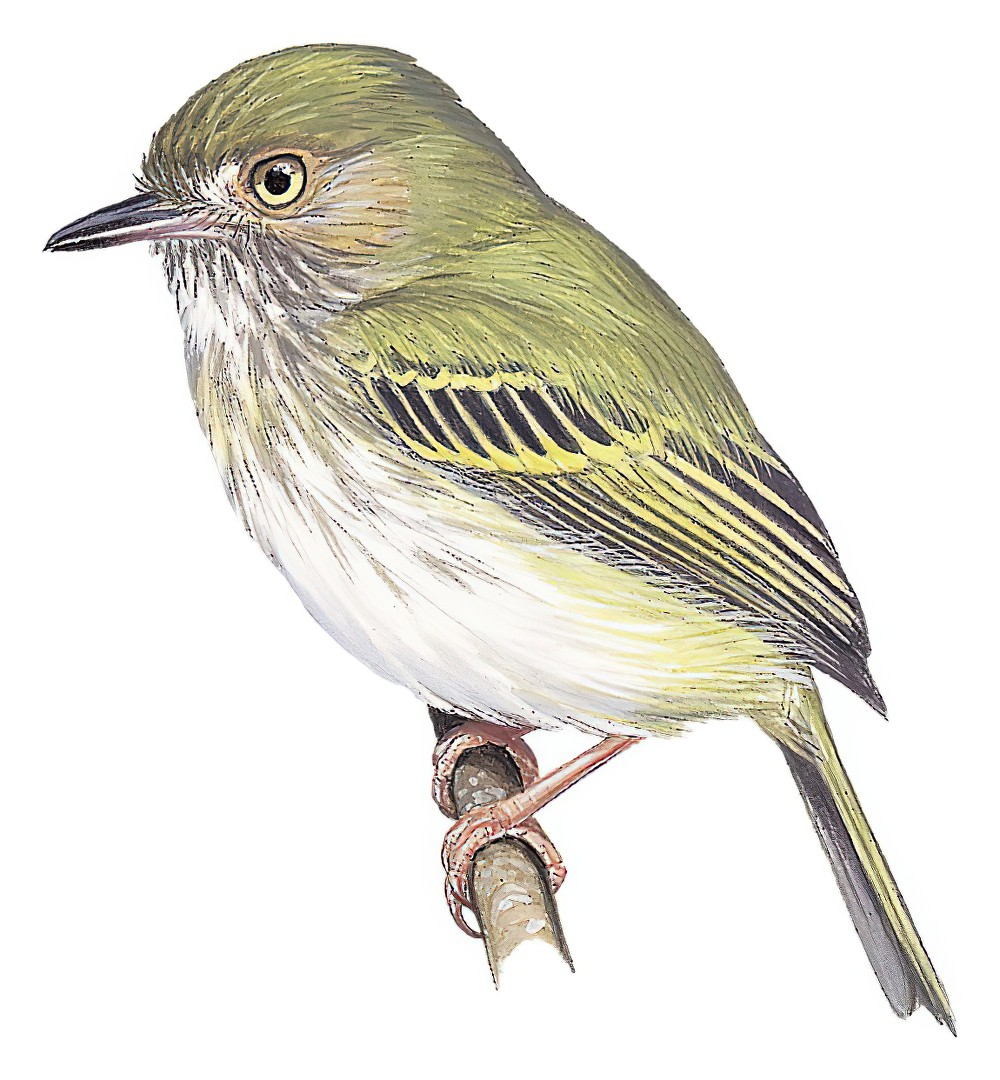Pale-eyed Pygmy-Tyrant / Atalotriccus pilaris

Pale-eyed Pygmy-Tyrant
SCI Name:
Protonym: C[olopterus] pilaris Arch.Naturgesch. 13 p.253 pl.5 fig.4
Taxonomy: Passeriformes / Tyrannidae / Atalotriccus
Taxonomy Code: peptyr1
Type Locality: environs of Cartagena, Bolivar, Colombia.
Author: Cabanis
Publish Year: 1847
IUCN Status: Least Concern
DEFINITIONS
ATALOTRICCUS
(Tyrannidae; Ϯ Pale-eyed Pygmy Tyrant A. pilaris) Gr. αταλος atalos delicate, tender; τρικκος trikkos unidentified small bird. In ornithology triccus signifies tyrant flycatcher; "Atalotriccus gen. nov. (Tyrannidæ.) Similar to Colopteryx Ridgway (ex Colopterus Cabanis, preoccupied), but head without crest, four, instead of three, outer primaries greatly reduced in size (the reduction excessive and the feathers very narrow and acuminate instead of normal in form), and bill much narrower. Type, Colopterus pilaris Cabanis = Atalotriccus pilaris. (Aταλος, tender, delicate; τρικκος, a small bird.)" (Ridgway 1905); "Atalotriccus RIDGWAY, Proc. Biol. Soc. Wash., 18, p. 208, 1905—type by orig. desig. Colopterus pilaris CABANIS." (Hellmayr, 1927, Cat. Birds Americas, Pt. V, p. 335).
pilaris
● L. pilaris hairless (i.e. crestless) < pilare to deprive of hair < pilus hair; "Diese der vorhergehenden [Colopterus cristatus = Colopteryx galeatus] sehr ähnliche Art unterscheidet sich besonders durch den Mangel eines deutlichen Schopfes" (Cabanis 1847) (Atalotriccus).
● Mod. L. pilaris thrush; a confused coining from L. pilus hair, mistaking Gr. τριχας trikhas type of thrush, for θριξ thrix, τριχος trikhos hair (cf. pilaris of the ball < pila ball); "95. TURDUS. ... pilaris. 2. T. rectricibus nigris: extimis margine interiore apice albicantibus, capite uropygioque cano. Fn. svec. 188. Turdus pilaris. Gesn. av. 753. Aldr. orn. l. 16. c. 3. Will. orn. 138. t. 37. Raj. av. 64. n. 3. Alb. av. I. p. 34. t. 36. Frisch. av. . . t. 26. f. 1. 2. Olin. av. 25. Habitat in Europa. Romani in ornithone maxima diligentia alebant Turdos, altiles reddebant, care pendebant, teste Varrone, Plutarcho. Nil melius Turdo, nil vulva pulchrius ampla. Horat." (Linnaeus 1758) (Turdus).
SUBSPECIES
Pale-eyed Pygmy-Tyrant (wilcoxi)
SCI Name: Atalotriccus pilaris wilcoxi
wilcoxi
A. L. Wilcox (fl. 1928) US businessman, President of United Fruit Co., Panama 1924-1928 (subsp. Atalotriccus pilaris).
Pale-eyed Pygmy-Tyrant (pilaris)
SCI Name: Atalotriccus pilaris pilaris
pilaris
● L. pilaris hairless (i.e. crestless) < pilare to deprive of hair < pilus hair; "Diese der vorhergehenden [Colopterus cristatus = Colopteryx galeatus] sehr ähnliche Art unterscheidet sich besonders durch den Mangel eines deutlichen Schopfes" (Cabanis 1847) (Atalotriccus).
● Mod. L. pilaris thrush; a confused coining from L. pilus hair, mistaking Gr. τριχας trikhas type of thrush, for θριξ thrix, τριχος trikhos hair (cf. pilaris of the ball < pila ball); "95. TURDUS. ... pilaris. 2. T. rectricibus nigris: extimis margine interiore apice albicantibus, capite uropygioque cano. Fn. svec. 188. Turdus pilaris. Gesn. av. 753. Aldr. orn. l. 16. c. 3. Will. orn. 138. t. 37. Raj. av. 64. n. 3. Alb. av. I. p. 34. t. 36. Frisch. av. . . t. 26. f. 1. 2. Olin. av. 25. Habitat in Europa. Romani in ornithone maxima diligentia alebant Turdos, altiles reddebant, care pendebant, teste Varrone, Plutarcho. Nil melius Turdo, nil vulva pulchrius ampla. Horat." (Linnaeus 1758) (Turdus).
Pale-eyed Pygmy-Tyrant (venezuelensis)
SCI Name: Atalotriccus pilaris venezuelensis
venezuelae / venezuelana / venezuelanus / venezuelense / venezuelensis
Venezuela (Italian Venezuola, a diminutive of Venezia Venice, alluding to native houses on stilts in the waters of Lake Maracaibo).
Pale-eyed Pygmy-Tyrant (griseiceps)
SCI Name: Atalotriccus pilaris griseiceps
griseiceps
Med. L. griseum grey; L. -ceps -headed < caput, capitis head.
UPPERCASE: current genus
Uppercase first letter: generic synonym
● and ● See: generic homonyms
lowercase: species and subspecies
●: early names, variants, mispellings
‡: extinct
†: type species
Gr.: ancient Greek
L.: Latin
<: derived from
syn: synonym of
/: separates historical and modern geographic names
ex: based on
TL: type locality
OD: original diagnosis (genus) or original description (species)












